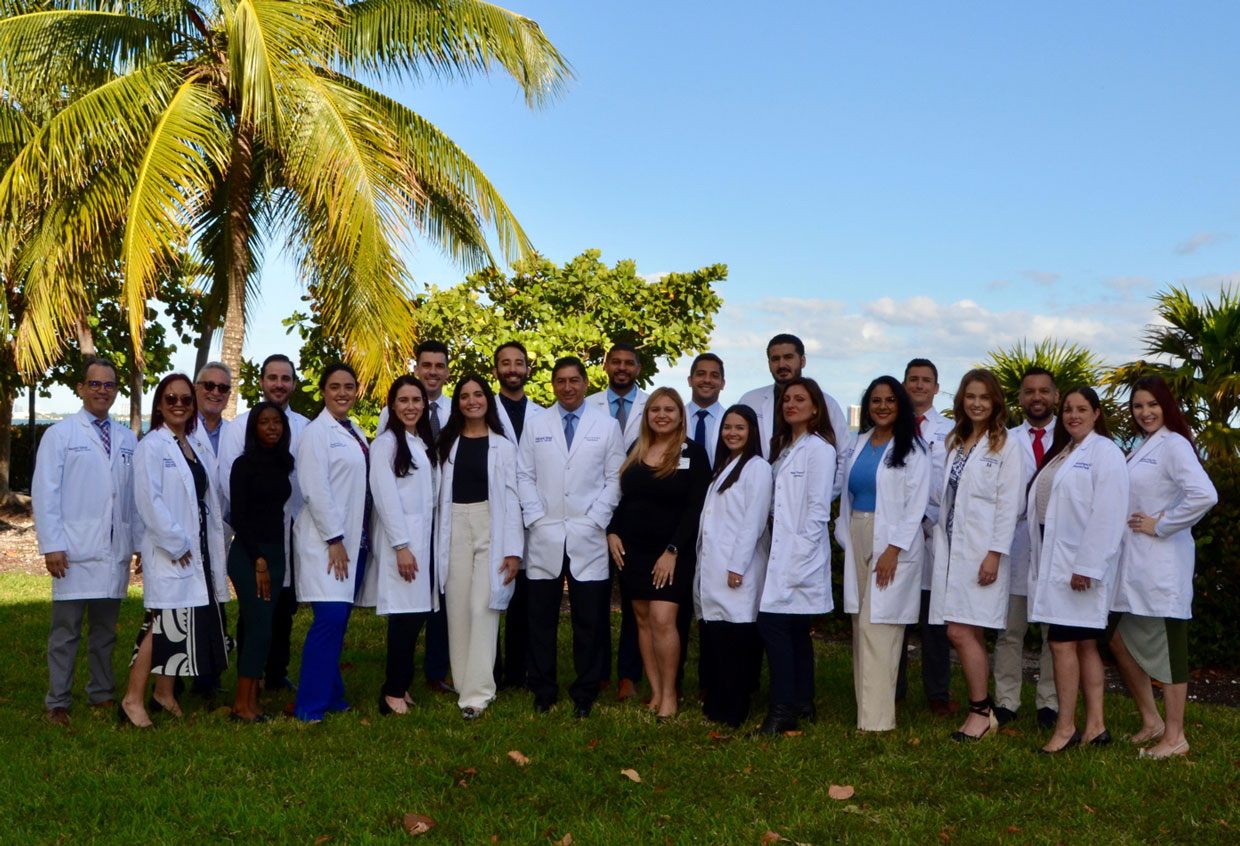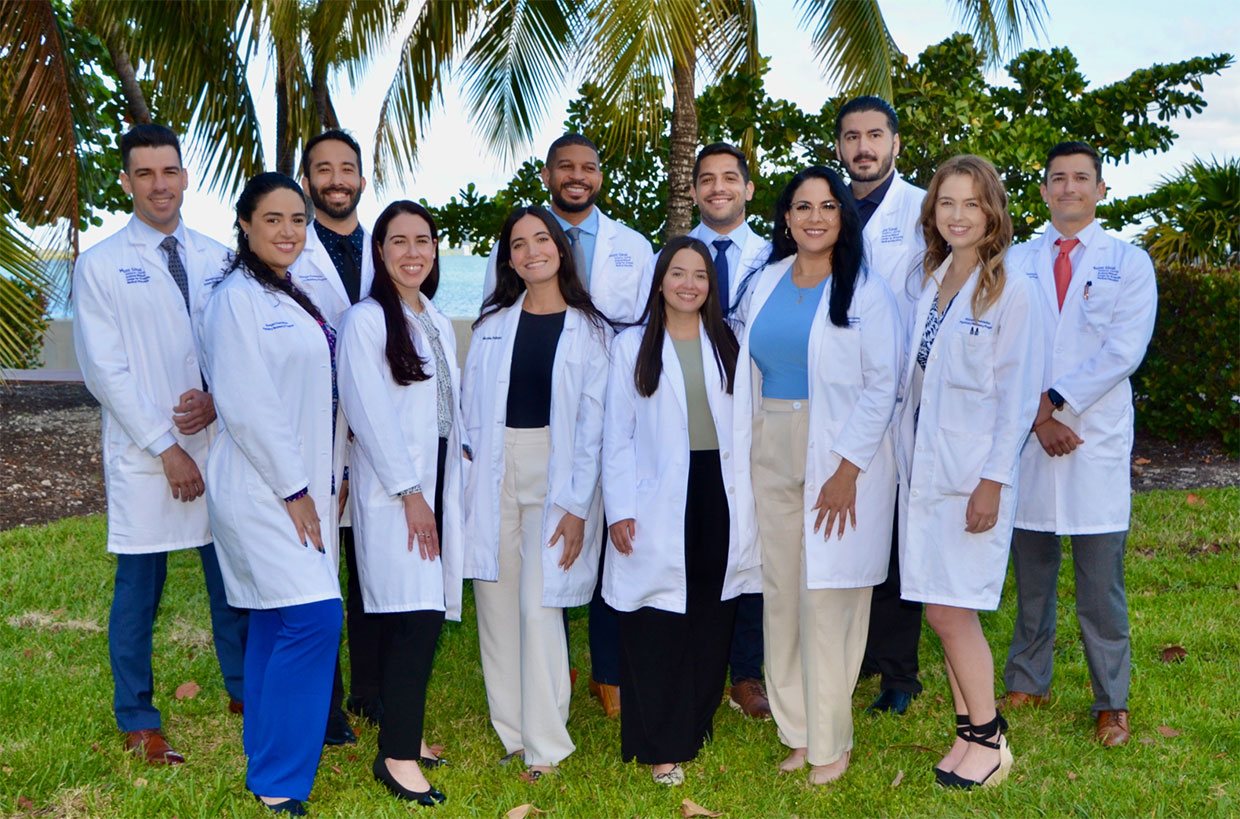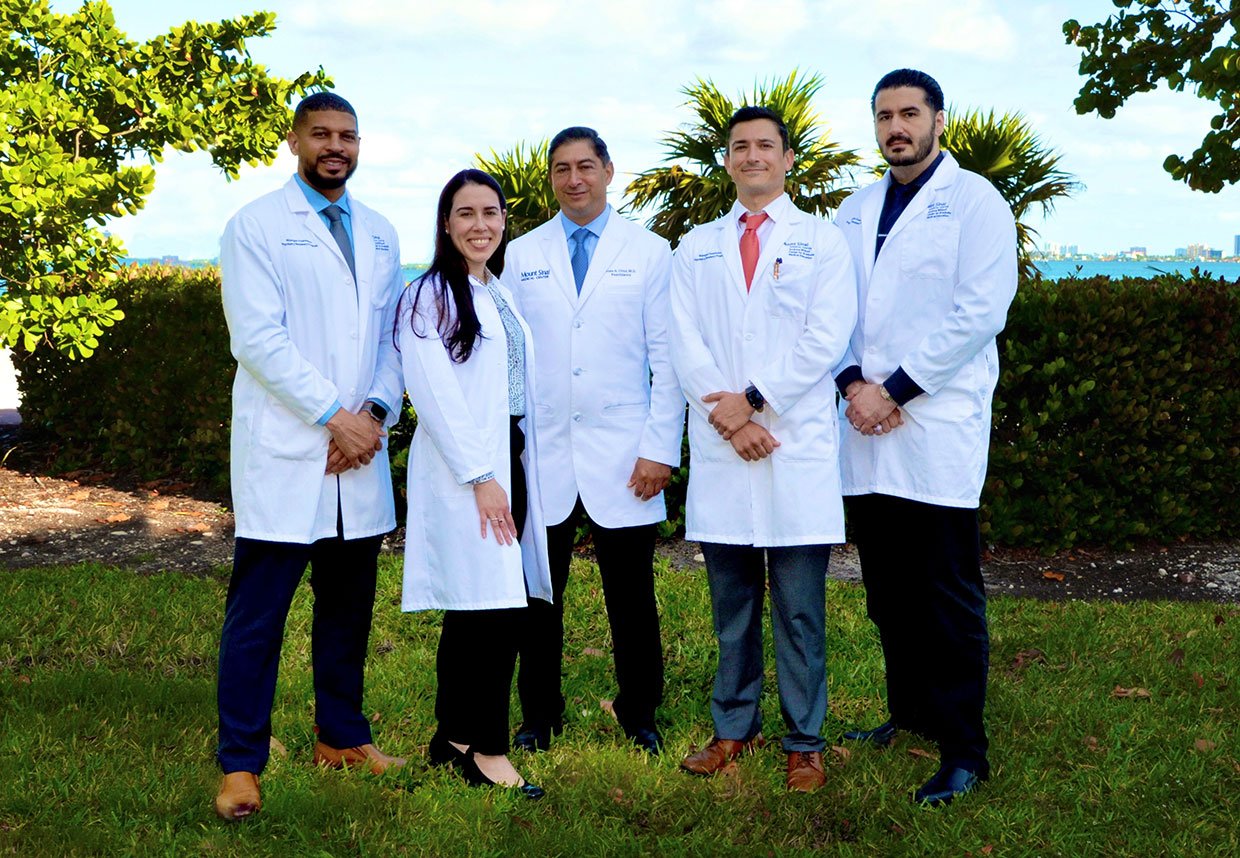Medical Education
Committed to Teaching Future Generations of Physicians for our Community
Medical Education
Committed to Teaching Future Generations of Physicians for our Community
On behalf of the Department of Psychiatry, we welcome your interest in the Mount Sinai Medical Center Residency Training Program.
The mission of our program is to train competent psychiatrists who hold the highest academic, clinical, ethical and professional standards. Our goal is to enable our residents to pursue careers in research, clinical care, or education, while they obtain board certification by the American Board of Psychiatry and Neurology. In addition, we aim to contribute to expanding postgraduate medical education opportunities in Miami-Dade County, which will produce competent psychiatrists who are able to relieve the state physician shortage — especially in the field of mental and behavioral health.
This program will provide the residents with comprehensive training in psychiatry, in both inpatient and outpatient settings, following the Accreditation Council for Graduate Medical Education (ACGME) requirements for training in psychiatry. Upon the successful completion of this program, residents will be eligible for certification in general psychiatry through the examination provided by the American Board of Psychiatry and Neurology (ABPN).
Your responsibility will be to gain the experience, knowledge and skills necessary to integrate the pathophysiology of disease with caring for your patients. We expect all of our residents to be self-directed learners who are willing to reach their highest potential and show genuine compassion for each patient and his or her family.
Sincerely,
Jose Cruz Jr., MD
Program Director, Allergan Foundation Psychiatry Residency Program
Schottenstein Family Chair for Behavioral Health

The curriculum is managed, modified, and evaluated by the program’s Residency Management Team (RMT), comprised of the department chair, program director, associate program director, senior medical educator, and program coordinator. Residents play a very active role in determining curricular offerings. Monthly evaluations of rotations and their components result in frequent modification of the curriculum.
The program director and associate program director will meet every other week with all residents as well as with each individual resident at least semiannually, to elicit residents’ concerns and ideas, and to identify any hospital systems issues. Program leadership maintains an “open-door policy” at all times, welcoming impromptu discussions of any concerns by residents in a nonthreatening, constructive atmosphere.
Residents and faculty are evaluated on a regular basis, and feedback is given in a timely manner. All evaluations of residents, faculty and rotations are reviewed by the program director as they are received; problems in any area are addressed immediately. Residents review their file in its entirety at the semiannual meeting with the program director or associate program director. Faculty members are given feedback by the program director as needed, with attention to protecting resident confidentiality.
The transition from first-year resident to second-year resident is reflected by increased responsibility in decision-making and patient care. First-year residents are closely supervised by more senior residents and faculty, gradually becoming more independent as the year progresses. This process evolves throughout the program, ensuring that residents are fully prepared for independent medical practice upon completion of the program.
Residents are expected to take an active role in planning their rotations, within the boundaries set by the ACGME, so that their individual needs and interests are met. Program leadership makes every effort to help residents with the pursuit of their career goals, directing them toward appropriate faculty members based on their particular interests. A formal mentoring program in which all residents are automatically assigned a mentor is in place.
PGY-1 Goals
PGY-2 Goals
PGY-3 Goals
PGY-4 Goals
At the conclusion of the one year of training, the learner should be able to do the following:
Under supervision, the resident will be able to gather medical information from multiple sources, assess cognitive functioning, communicate with members of the health care team, order appropriate diagnostic studies, and start utilizing both pharmacologic and psychotherapeutic interventions to enhance patient care. Residents start developing skills to manage patients from a biopsychosocial perspective, to perform complete psychiatric assessments with attention to primary co-morbid medical conditions. Residents are expected to generate a differential diagnosis, propose and introduce a thorough patient evaluation, and develop a plan of treatment, all under the supervision of the attending psychiatrist. Residents will know about collaboration in patient care and will participate in group and family therapy sessions, and will learn psychotherapy modules.
Residents will be evaluated by the generalist faculty who participate in psychiatric rotations. In addition, competency-based evaluations will be completed online through the My Evaluations system.
A system of learning and training that balances service and education is stressed. Our program curriculum includes a far greater number of didactic sessions than the minimum required by the ACGME. A reasonable workload and excellent ancillary support services in the hospital ensure residents have the opportunity to regularly attend these formal learning activities.
Jadiyer Acosta, MD
Medical School: Instituto Superior de Ciencias Médicas de Villa Clara, Santa Clara, Cuba, 1996
Residency: General Psychiatry, Larkin Community Hospital, Florida, 2017
Yanko Enamorado, MD
Medical School: Universidad Iberoamericana, Dominican Republic, 2010
Residency: General Psychiatry, Cooper Hospital of Rowan University, New Jersey, 2014
Fellowship: Electroconvulsive Therapy, Emory University School of Medicine, Georgia, 2017; Child and Adolescent Psychiatry, Hofstra/Northwell, New York, 2016
Robert Martinez, MD
Medical School: Florida International University, Miami, FL 2016
Residency: The Zucker School of Medicine / Northwell Health at Mather Hospital, Port Jefferson, NY 2020
Maribel Rodriguez, MD
Medical School: American University of Antigua College of Medicine, Antigua 2016
Residency: Mount Medical Center – Psychiatry, Miami Beach, FL 2022
Rogelio Suarez, MD
Medical School: Instituto Superior de Ciencias Médicas, Santiago de Cuba, Cuba, 1990
Residency: General Psychiatry, Larkin Community Hospital, Florida, 2017
Fellowship: Family Medicine, Guantánamo, Cuba, 1995
Dakydra Thompson
Residency Coordinator

Dominick Cabrera, DO
Medical School: Nova Southeastern University, Florida
Vladislav Milanovic, MD
Medical School: University of Illinois College of Medicine, Illinois
Nathaniel Tang, MD
Medical School: Lewis Katz School of Medicine at Temple University, Pennsylvania
Emma Bennett, MD
Medical School: Florida International University, Florida
Marnie Ruiz, MD
Medical School: Northwestern University Feinberg School of Medicine, Illinois
Omar Shahbaz, MD
Medical School: Universidad Iberoamericana (UNIBE), Dominican Republic
Beatriz Errasti, MD
Medical School: Universidad de Ciencias Medicas de la Habana, Cuba
Melissa Hernandez, MD
Medical School: Universidad Nacional Pedro Henriquez Urena Escuela de Medicina, Dominican Republic
Nicole Pabon, MD
Medical School: Universidad Central del Caribe School of Medicine, Bayamon, Puerto Rico
Nicolas Biaggi, MD
Undergraduate: Florida International University, Florida
Medical School: Albany Medical College, New York
Carlos Cueto, MD
Undergraduate: Florida International University, Florida
Medical School: New York Medical College, New York
Brian Bender, MD
Concierge Psychiatrist at MindBender Health, FL
Yakov Niyazov, MD
Clinical Psychiatrist at MyPsychiatrist, FL
Ideen Kiafar, DO
Fellowship in Child and Adolescent Psychiatry, Stanford University, CA
Liliam Santiesteban, DO
Clinical Psychiatrist at Mount Sinai Medical Center Hialeah Primary & Specialty Care, FL
Stephane Degraff, MD
Clinical Psychiatrist at Spectrum Health Lakeland Medical Center, Michigan
Michael Flowers, MD
Clinical Psychiatrist at James A. Haley Veterans’ Hospital, FL
Leisha Quinones, MD
Fellowship in Child and Adolescent Psychiatry, Nicklaus Children’s Hospital, FL.
Nicole Redondo, MD
Fellowship in Child and Adolescent Psychiatry, Nicklaus Children’s Hospital, FL.
Maribel Rodriguez, MD
Clinical Psychiatrist for the Psychiatry Group Practice at Mount Sinai Medical Center, Miami Beach, FL.
Melissa Verzura, DO
Clinical Psychiatrist for the Wein Center for Alzheimer’s disease and Memory Disorders at Mount Sinai Medical Center, Miami Beach, FL.

Psychiatry Residency Program 2024 Graduates.
Three positions are offered at Mount Sinai Medical Center’s Psychiatry Residency Program each year.
Mount Sinai Medical Center participates and accepts applications only through ERAS (Electronic Residency Application Service). In addition, your application will only be considered if you are enrolled in the National Resident Matching Program (NRMP). You must contact your medical school for delivery of your application, transcripts, and Dean’s Letter and faculty recommendations to our program via the internet.
NRMP#: 1105400C0
Program ID#: 4001100323
Upon receipt of the completed application, our selection committee will review all materials. Invitations for interviews will be offered via email from Dakydra Thompson (program coordinator).
Inquiries may be directed to Dakydra Thompson, via email at Dakydra.thompson@msmc.com
Final confirmation for appointment shall be subject to a satisfactory health examination conducted by the medical center’s Employee Health Services Department. The physical examination will include a screening test for the presence of non-prescribed substances, alcohol and nicotine products. Offers of appointment to prospective employees who test positive for nicotine will be rescinded.
Thank you for your interest in our Psychiatry Residency Training Program.
Review the latest health news and updates from across the medical center.
Read about our well-deserved reputation for the highest quality of care.
Learn more about the Irma and Norman Braman Comprehensive Cancer Center, scheduled to open in 2025.
I voluntarily consent and give authorization to appear in live broadcasts, films, photographs, videotapes, and audiotapes and to permit the use of such to be published or broadcast, republished or rebroadcast, including dissemination on the Internet.
I understand that the purpose(s) for which the information will be used include: Mount Sinai Medical Center staff education, educational or training needs of the medical profession, marketing and/or publicity activities carried out by or on behalf of Mount Sinai Medical Center, and/or any and all other purposes consistent with Mount Sinai’s mission of patient care, education and research.
I further authorize the modification or retouching of such films, photographs and/or tapes, and I waive any right to inspect or approve the finished product and/or any copy that may be used in connection with the above.
I understand and consent to the observation of my procedure by other health care providers for educational purposes and to my physician (or designee) making photographic, videotape, DVD or other similar photographic format of the procedure which shall remain in the physician’s custody and will not be made a part of my permanent record.
I further understand that my participation will not entitle me to remuneration or compensation now or in the future, and this shall be binding upon my heirs, personal representatives and assignees. As such, I assume full responsibility and hereby agree to hold Mount Sinai Medical Center harmless from any and all liability arising in connection with the above.
I understand I have the right to request cessation of recording or filming and if consent is withdrawn Mount Sinai will cease and desist distribution and/or use of file, videotape or photographs.
I understand that the information to be disclosed hereunder is subject to re-disclosure and that any such re-disclosure may not be subject to federal privacy restrictions. I understand that this authorization will not expire unless revoked by me and that I may revoke this authorization at any time before Mount Sinai Medical Center takes action in reliance on this authorization by notifying the Mount Sinai Medical Center Office of Public Relations, in writing, at 4300 Alton Road, Miami Beach, Florida 33140.

